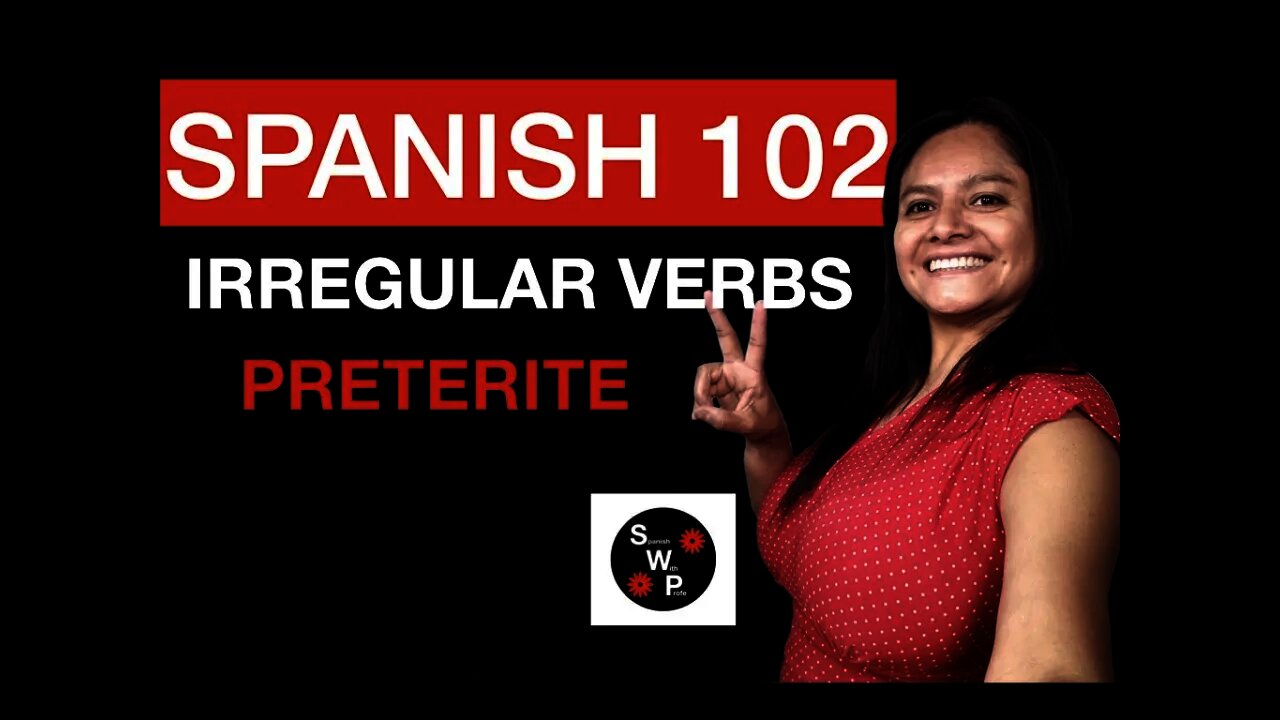Premium Only Content

Spanish 102 - Irregular Verbs in the Preterite for Beginners Spanish With Profe
In this video you will learn about irregular verbs in the preterite in Spanish. Remember the preterite or el pretérito is another form of the simple past in Spanish. The pretérito is used to talk about completed actions in the past tense. It is used to talk about the beginning of an action or the ending of an action in the past.
Remember that we have learned two additional irregular verbs in the pretérito (ser & ir a) and today we are going to add some more to the list of irregular verbs in el pretérito.
Most irregular verbs will have a very different root in the pretérito, so you will need to remember that, and use the new root, and then add the endings given below. Most irregular verbs will have this set of endings in the pretérito.
yo -e,
tú -iste
él, ella, usted -o
nosotros/as -imos
ellos, ellas, ustedes -ieron
estar =estuv_ (was, were)
yo estuve
tú estuviste
él, ella, usted estuvo
nosotros/as estuvimos
ellos, ellas, ustedes estuvieron
tener= tuv_(had)
yo tuve
tú tuviste
él, ella, usted tuvo
nosotros/as tuvimos
ellos, ellas, ustedes tuvieron
venir= vin_ (came)
yo vine
tú viniste
él, ella, usted vino
nosotros/as vinimos
ellos, ellas, ustedes vinieron
poder =pud_ (to manage, to fail)
yo pude
tú pudiste
él, ella, usted pudo
nosotros/as pudimos
ellos, ellas, ustedes pudieron
poner = pus_ (put)
yo puse
tú pusiste
él, ella, usted puso
nosotros/as pusimos
ellos, ellas, ustedes pusieron
saber=sup_ (to find out)
yo supe
tú supiste
él, ella, usted supo
nosotros/as supimos
ellos, ellas, ustedes supieron
querer=quis_ (to try, to refuse)
yo quise
tú quisiste
él, ella, usted quiso
nosotros/as quisimos
ellos, ellas, ustedes quisieron
ver=v_(saw)
yo vi
tú viste
él, ella, usted vio
nosotros/as vimos
ellos, ellas, ustedes vieron
hacer= hic_, hiz_ (made, did) : hic (yo, tú, nosotros/as, ellos, ellas, ustedes); hiz (él, ella, usted)
yo hice
tú hiciste
él, ella, usted hizo
nosotros/as hicimos
ellos, ellas, ustedes hicieron
The verb dar (to give) is an irregular one but it will follow the regular -er/-ir endings without tildes.
dar=d_ (gave)
yo di
tú diste
él, ella, usted dio
nosotros/as dimos
ellos, ellas, ustedes dieron
The verbs: decir, traer, conducir, and traducir will do two different things:they will all have a "j" and their ending in the 3rd person plural will be "eron
dij_, traj_, conduj_, traduj_
-e
-iste
-o
-imos
-eron
decir=dij_ (said/told)
yo dije
tú dijiste
él, ella, usted dijo
nosotros/as dijimos
ellos, ellas, ustedes dijeron
traer=traj_(brought)
yo traje
tú trajiste
él, ella, usted trajo
nosotros/as trajimos
ellos, ellas, ustedes trajeron
conducir=conduj_(drove)
yo conduje
tú condujiste
él, ella, usted condujo
nosotros/as condujimos
ellos, ellas, ustedes condujeron
traducir=traduj_(translated)
yo traduje
tú tradujiste
él, ella, usted tradujo
nosotros/as tradujimos
ellos, ellas, ustedes tradujeron
haber=there is / there are
hubo (there was/there were)
Some Ways Below To Help Out The Channel Listed Below
► DONATIONS via PayPal (To help support the channel you can donate via PayPal): https://paypal.me/SpanishWithProfe?locale.x=en_US
► ROBINHOOD (Get 1 Stock When You Sign Up. Easy to use app for investing and you get a free stock.): https://join.robinhood.com/grants1730
► WEBULL (Get 2 Stock When You Sign Up):https://www.webull.com/activity/get-free-stocks?inviteCode=uYiu2aNdG46N&source=invite_gw&inviteSource=wb_oversea
► CRYPTO.COM Use my referral link https://crypto.com/app/e3p3g4rc9m to sign up for Crypto.com and we both get $25 USD :)
-
 14:52
14:52
Spanish With Profe
1 year ago25 Advanced Spanish phrases that can help you take your Spanish language skills to the next level P1
221 -
 7:36
7:36
Colion Noir
15 hours agoDonald Trump Issues Executive Order To Protect The Second Amendment
105K67 -
 13:39
13:39
Exploring With Nug
20 hours ago $7.03 earnedCars Found Underwater While Searching Georgia Woman!
86.7K3 -
 56:50
56:50
IsaacButterfield
1 day ago $9.26 earnedSam Kerr Goes To Jail | Americas Worst Law | Teacher Of The Year
95.6K18 -
 6:14
6:14
Silver Dragons
1 day agoAmerican Silver Eagle Coins - Dealer Reveals Everything You NEED to Know
86.7K10 -
 19:18
19:18
Neil McCoy-Ward
1 day ago🚨 The USAID Scandal Goes Way Deeper Than We Could Have Imagined!
80K39 -
 14:29
14:29
Bearing
22 hours agoTHE BIG BALLS EFFECT - Democrats MELT DOWN Over DOGE & USAID 🔥
72.7K89 -
 11:35
11:35
China Uncensored
1 day agoChina Nuclear Fusion Breakthrough Shocks The World
84.9K56 -
 50:19
50:19
AlaskanBallistics
1 day ago $2.90 earnedI Love This Gun Podcast Episode 6
59.9K2 -
 16:35
16:35
DEADBUGsays
1 day agoPolice Stories Ep4
39.4K